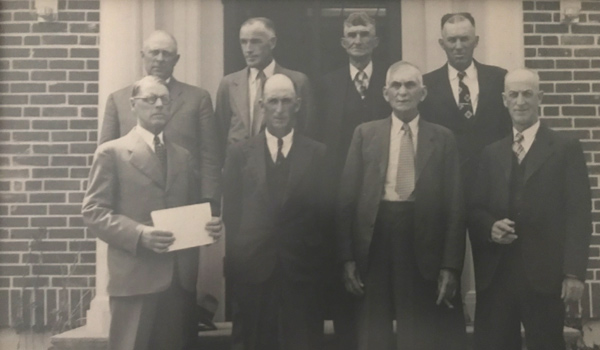Godmanchester History 1937-1941
1937-1941
The main points of interest in the municipality of Godmanchester relate to the nature and quality of its landscapes. The hamlet of Dewittville, which is partly located in Hinchinbooke, offers, among other things, heritage buildings such as one of the oldest post offices in the country (1833, now inactive) and the house built by Jacob De Witt in 1837.
Jacob De Witt, important character for the region
Jacob De Witt (1785-1859), an important figure within the region, participated in numerous projects the significance of which radiated far beyond the boundaries of the MRC. An immigrant from the United States, he first arrived in Montreal with his family at the age of 17. He opened his first business, a hardware store, at age 22. To diversify his assets, he began to invest in real estate and shipping. A successful businessman and politician, he was considered one of Montreal’s leading landowners (1825). In 1829, he acquired the sawmill and 130 acres of land at Portage, which later became Dewittville. His achievements include the founding of the Montreal General Hospital, the creation of the People’s Bank and a role in the founding of the Bank of Canada.
Origin of Godmanchester
A mere 34 years separate the official settlement of the Township of Godmanchester (1811) and the creation of the homonymous municipality township (1845) in the Montérégie. In 1847, it was abolished and attached to the municipality of Beauharnois County, before being reinstated in 1855. According to the 1861 census, there were at total of 720 inhabitants. The parish of Saint-Joseph (-de-Huntingdon), located south of Lake Saint-François, a short distance south-west of Salaberry-de-Valleyfield, counted 2,890 inhabitants, half of whom were Catholic, even though there were only 225 French Canadians. At the time the municipality of the village of Huntingdon was established in 1848, Godmanchester included the remaining territory of the township annexed by the Huntingdon and Saint-Anicet settlements when it was reinstated in 1855. The first arrivals were Canadian corps soldiers who had been discharged at the time of the American Revolution in the late 18th century. Surveyor William Chewett named the new township after an English town in Huntingdon County. The oldest recorded name for Godmanchester is Gormon Castria. In England, almost all geographical locations that included the component Castria at the time of Roman occupation, which referred to the Latin castra or camp, saw the constituent element changed to the form of Chester. As such, the recognized demonym in 1986, Godmancastrian, marks a return to the Latin origin of the name of the municipality while also endowing it with a French consonance in harmony with the language of Molière.
 1937-1941
1937-1941